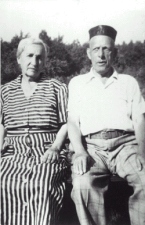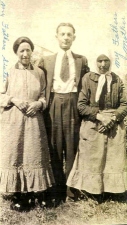|
On
the afternoon of July 10, Dick Silverstein was surfing the Internet when he
became intrigued by a story posted by the Reuters wire service headlined
"Poland, Facing Its Past, Apologizes for WWII Pogrom."
|
|
|
|
 |
|
Freida & Moses Silverstein (originally Sztabinski), grandparents of Dick Silverstein
(Freida from Jedwabne,
Moses from Radzilow,
Photo taken in USA)
Moses went to America,
1905-1910; Frieda went
to America, 1912 |
|
|
| |
|
As he relates in a letter he later wrote to friends and family, "The name of the place leaped out
from the computer monitor and penetrated my brain indescribably: Jedwabne."
That is because Dick Silverstein had long been searching for information about
the Polish shtetl where his father, the late Julius Silverstein, lived before
emigrating to America in 1912. Dick Silverstein says he had envisioned the
town's name being spelled "Yidvabneh," based on his father's pronunciation. The
father told the son that "Yidvabneh" was close to a big city, Lomza. Julius
Silverstein told Dick he had come over "on the herring boat" at age 6, along
with his mother, Freida, and four older siblings. Their husband/father, Moses
Silverstein, had emigrated several years earlier.
While Dick Silverstein says he had never done any serious genealogical research,
he had searched several times on maps of Poland for "Yidvabneh."
"It was easy for me to find Lomza on a map. But no Yidvabneh. Not until July 10,
2001," he wrote. "A quick check on the Internet revealed that Jedwabne was only
19 kilometers (about 12 miles) from Lomza! The (Reuters) story related
circumstances surrounding the mass destruction of the Jewish population of
Jedwabne in a single day, July 10, 1941. Jedwabne, it said, was a small town of
2,500, of whom 1,600 were Jewish. After the war, only two - yes two - Jews who
had lived in Jedwabne at that time had survived."
The Jedwabne massacre story was told in an acclaimed book, "Neighbors," by Jan T.
Gross, whose publication led to the memorial ceremony in Poland last month.
So, on the night of July 10, after his discovery, Dick Silverstein debated whether
to inform his father's slightly older brother, Meyer Silverstein, now 98 and
living on the East Coast, of the disturbing news he had just learned. He decided
to do so.
|
|
|
"...
Dick Silverstein debated whether to inform his father's slightly older
brother, Meyer Silverstein of the disturbing news he had just learned.
He decided to do so..." |
|
|
|
"Not only did he know of the Jedwabne story," Dick Silverstein wrote, "but he
had found it out upon reading the Book Review section of the Sunday New York
Times, then read the book describing the Jedwabne tragedy, and had already
passed it on to his daughter. ...
|
|
|
|
 |
|
1931
Meyer Silverstein (originally Sztabinski)
Born in 1904, left for America in 1913;
Went to visit in 1931.
Women: (L) his aunt; (R) his grandmother
Meyer went to
America, 1913 |
|
|
| |
|
"Uncle Meyer also provided me that evening with additional information on our
family that was new to me. Whereas grandmother and her side of the family had
been from Jedwabne, my grandfather had been from another town, Radjedlava, and
there had been a pogrom in that town at about the same time. Radjedlava was a
name that I recognized as the name of a synagogue - not in Poland, but in New
York."
After a bit more research on the Internet, Silverstein learned that what he had
called "Radjedlava" was, in fact, spelled Radzilow, and that the Jews there had
indeed experienced a pogrom on July 7, 1941, just three days before the Jedwabne
tragedy. A map showed Lomza, Jedwabne and Radzilow all to be in close proximity
to each other.
"Things were beginning to fit together," Dick Silverstein wrote. "My grandmother
had lived in Jedwabne, and not Radzilow, together with her children. This
presumably was so she could be close to her side of the family, while her
husband was exploring conditions in the New World ... The Radzilower Shul in
Brooklyn was presumably formed and named by former residents of Radzilow,
including my grandfather, who were now living in the same neighborhood of New
York.
"This new information also - at long last - was providing a more definitive
explanation as to why grandmother suddenly stopped receiving letters from her
family in Jedwabne at a particular point during World War II. With a look of
sadness I will never forget, Dad once related that one of his mother's relatives
had come to New York to live, was disappointed that Jews in New York were not
"more religious" and decided to return to Jedwabne. He, like many other of my
grandmother's relatives, disappeared into The Night."
|